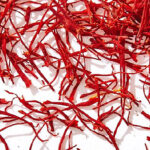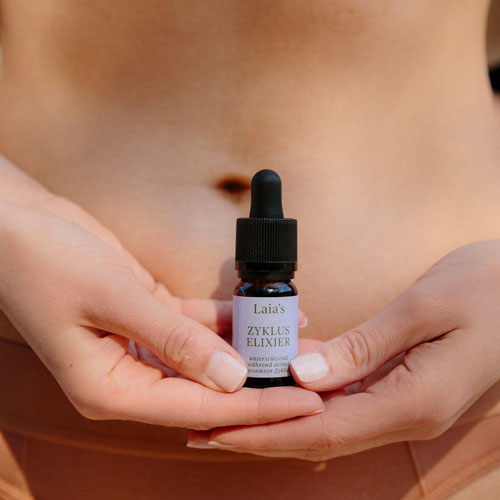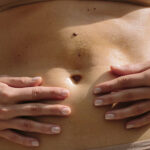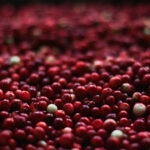
Unveiling “The Golden Effect” – Harnessing Saffron for Menstrual Health
Saffron, famously dubbed as “red gold,” stands as one of the most coveted spices globally, owing to its exquisite nature

Do you often feel down, puffy, have mood swings and headaches in the days leading up to your period? Then you’re like many women in the second half of their cycle. In this article, we explain the possible causes of your symptoms and the natural options for treating PMS.
Many women are affected by premenstrual syndrome (PMS). Between 25% and 90% of all women have symptoms, although studies on PMS are still unclear.1 The exact cause has also not yet been clarified. A multifactorial trigger of genetic disposition and hormonal disorders is suspected.2 Premenstrual syndrome occurs in the luteal phase, i.e. in the second half of the menstrual cycle, with most women experiencing the most severe symptoms in the week before their period. However, the symptoms can also persist during menstruation. If the symptoms are very severe, they are referred to as premenstrual dysphoric disorder (PDMS).3
Common symptoms
PMS symptoms can be very diverse and vary in their severity and duration from woman to woman. Up to 300 symptoms, which can be both physical and psychological in nature, are known.
The most common physical complaints include water retention, headaches and back pain, cravings, nausea, breast tenderness, digestive problems and skin blemishes.
Psychological symptoms mainly manifest themselves in the form of mood swings, concentration problems, sleep disorders and even depression can occur. For some women, the symptoms are so stressful that they can also lead to social withdrawal during this time.4
Hormone preparations such as ovulation inhibitors (birth control pills) or progesterone preparations as well as antidepressants are often used to treat PMS and PDMS.5 These drugs have a strong influence on the body and can have many undesirable side effects. As the exact cause of PMS and PDMS is still unclear, treatment is aimed at alleviating the symptoms. If your symptoms are so severe that they severely restrict your quality of life and put a strain on your everyday life, you should always consult a doctor.
Your lifestyle can have an influence on the severity of your symptoms. If you only experience mild symptoms, there are various natural alternatives that can provide relief. We’ll tell you about them here.
Nutrition
Your diet can have a big impact on how you feel in the days leading up to your period and during your period. Make sure you eat a balanced diet with plenty of fruit and vegetables and healthy, unsaturated fats.6 You can prevent water retention by eating as little salt as possible. You should also minimize your intake of coffee, chocolate and alcohol in the days leading up to your period. You should also avoid refined sugar as much as possible, as this can favor hormonal fluctuations.7
A diet rich in vitamins and minerals can help to alleviate the symptoms. Symptoms can be prevented by a high intake of calcium, magnesium, vitamin D, omega-3 fatty acids and B vitamins. You should also eat as many complex carbohydrates and fiber as possible, as these have a positive effect on your digestion and can help to break down excess oestrogen.8
Our vitamin drops for women, e.g. our pre-menstrual elixir with natural linseed oil, evening primrose oil, almond oil and saffron syrup, can help you to cover your daily requirements of vitamin D and vitamin E as well as your need for omega-3 fatty acids and support your body in the time before your period.
Reduce stress
Stress can not only have a negative effect on your psyche, it can also exacerbate physical complaints such as headaches or cramps. So avoid stress as much as possible during this time and treat yourself to rest and relaxation.
With 5% CBD oil and omega-3 fatty acids, our cycle elixir for women can help to reduce stress, relax and alleviate symptoms.
Sport and exercise
Sport not only keeps you fit and healthy, exercise and sport can also help to alleviate your PMS symptoms. Exercise can help to break down stored water more quickly. Sport also stimulates your metabolism, promotes blood circulation and can therefore have an antispasmodic effect. The happiness hormones released during exercise can also help to alleviate your mood swings and depressive moods.9
Relaxation exercises
Relaxation exercises can also help you to reduce stress, relieve cramps and alleviate your psychological symptoms. Try integrating meditation, a short yoga session or autogenic training into your everyday life.
Cycle and symptoms tracking
A cycle calendar not only helps you to get to know your body better. Tracking your cycle and your PMS symptoms can also help you to recognize possible triggers for your symptoms and avoid them. In addition, getting to know your own body and your individual symptoms can help you find a better way of dealing with them.
Bid farewell to lower abdominal discomfort and menstrual cramps with the soothing touch of our warming menstrual oil, The Noon. Imbued with the goodness of chili and St. John’s Wort, this therapeutic massage oil is designed to bring relief and alleviate pain and cramps before and during your period. Embrace a sense of comfort and ease with this carefully formulated solution.
Footnotes/Sources
1 – https://link.springer.com/content/pdf/10.1007/s10304-008-0280-7.pdf
2 – https://www.gelbe-liste.de/krankheiten/praemenstruelles-syndrom-pms)
3 – https://link.springer.com/content/pdf/10.1007/s10304-008-0280-7.pdf
4 – https://www.gelbe-liste.de/krankheiten/praemenstruelles-syndrom-pms)
5 – https://link.springer.com/content/pdf/10.1007/s10304-008-0280-7.pdf
6 – https://www.apotheke-leipzig.de/medizin/praemenstruelles-syndrom/
7 – https://www.thefemalecompany.com/magazin/wie-kann-ich-mich-vor-pms-schuetzen/
8 – https://www.thefemalecompany.com/magazin/wie-kann-ich-mich-vor-pms-schuetzen/
9 – https://www.frauenaerzte-im-netz.de/erkrankungen/praemenstruelles-syndrom-pms/therapiemassnahmen-behandlung/

Saffron, famously dubbed as “red gold,” stands as one of the most coveted spices globally, owing to its exquisite nature

Our body, mood, and overall well-being are greatly influenced by hormones. We become acutely aware of this influence during puberty,

Today, let’s embark on a journey through the intricate workings of our bodies and the profound influence of cycle hormones.

Experiencing sensations of fullness, abdominal pressure, bloating, and discomfort are all characteristics of an unpleasant bloated stomach, often accompanied by

While it is true that men can also suffer from cystitis, the urethra is much shorter in women than in

Migraines are a common and very unpleasant headache disorder. In Germany, around 14.8% of women and 6% of men are
![]()
123 Main Street
City Name, Region
Postal Code, Country
Designed & Developed by e-outbox.